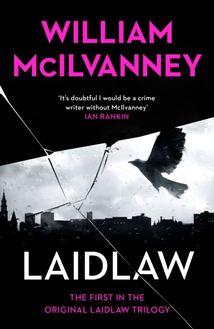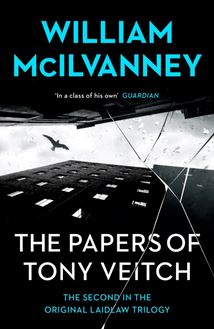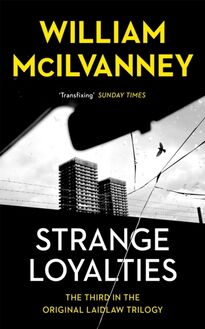Papers of Tony Veitch , livre ebook
143
pages
English
Ebooks
2013
Vous pourrez modifier la taille du texte de cet ouvrage
Obtenez un accès à la bibliothèque pour le consulter en ligne En savoir plus
Découvre YouScribe en t'inscrivant gratuitement
Découvre YouScribe en t'inscrivant gratuitement
143
pages
English
Ebooks
2013
Vous pourrez modifier la taille du texte de cet ouvrage
Obtenez un accès à la bibliothèque pour le consulter en ligne En savoir plus
Publié par
Date de parution
03 juin 2013
Nombre de lectures
6
EAN13
9780857869982
Langue
English
Publié par
Date de parution
03 juin 2013
Nombre de lectures
6
EAN13
9780857869982
Langue
English
William McIlvanney is the author of the award-winningLaidlaw trilogy, featuring Glasgow’s original maverick detective.Both Laidlaw and The Papers of Tony Veitch gained Silver Daggersfrom the Crime Writers’ Association, while the third in theseries, Strange Loyalties , won the Glasgow Herald ’s People’s Prize.He died in December 2015. The Papers of Tony Veitch is the second in the original LaidlawTrilogy.
Also by William McIlvanney The Laidlaw Trilogy Laidlaw Strange Loyalties Other Novels The Big Man Remedy Is None A Gift from Nessus Docherty The Kiln The Weekend With Ian Rankin The Dark Remains
The paperback edition published in Great Britain and Canada in 2021 by Canongate Books Distributed in Canada by Publishers Group Canada First published in 2013 by Canongate Books Ltd, 14 High Street, Edinburgh EH1 1TE First published in Great Britain in 1983 by Hodder and Stoughton Ltd This digital edition first published in 2013 by Canongate Books canongate.co.uk Copyright © William McIlvanney, 1983 Extract from Strange Loyalties © William McIlvanney, 1991 The right of William McIlvanney to be identified as the author of this work has been asserted by him in accordance with the Copyright, Designs and Patents Act 1988 British Library Cataloguing-in-Publication Data A catalogue record for this book is available on request from the British Library ISBN 978 1 83885 622 9 eISBN 978 0 85786 998 2
For Hilda, who knows why
Contents
Chapter 1
Chapter 2
Chapter 3
Chapter 4
Chapter 5
Chapter 6
Chapter 7
Chapter 8
Chapter 9
Chapter 10
Chapter 11
Chapter 12
Chapter 13
Chapter 14
Chapter 15
Chapter 16
Chapter 17
Chapter 18
Chapter 19
Chapter 20
Chapter 21
Chapter 22
Chapter 23
Chapter 24
Chapter 25
Chapter 26
Chapter 27
Chapter 28
Chapter 29
Chapter 30
Chapter 31
Chapter 32
Chapter 33
Chapter 34
Chapter 35
Chapter 36
Chapter 37
Chapter 38
Chapter 39
Strange Loyalties
1
I t was Glasgow on a Friday night, the city of the stare. Getting off the train in Central Station, Mickey Ballater had a sense not only of having come north but of having gone back into his own past. Coming out on to the concourse, he paused briefly like an expert reminding himself of the fauna special to this area.
Yet there was nothing he couldn’t have seen anywhere else. He was caught momentarily in the difficulty of isolating the sense of the place. Cities may all say essentially the same thing but the intonations are different. He was trying to re-attune himself to Glasgow’s.
There were a few knots of people looking up at the series of windows where train departures were posted. They looked as if they were trying to threaten their own destination into appearing. On the benches across from him two women surrounded by plastic shopping-bags looked comfortably at home. Nearby a wino with a huge orange beard that suggested he was trying to grow his own bedclothes was in heated debate with a Guinness poster.
‘They’ll no serve ye, sir.’ The speaker was a small man who had stopped to watch the wino. The small man was in his sixties but his face was as playful as a pup. ‘I spent an hour last week tryin’ tae get a drink there.’ He glanced at Mickey before moving on. ‘Hope springs eternal in the human chest.’
It was the moment when Mickey arrived in Glasgow, in a city that was about proximity not anonymity, a place that in spite of its wide vistas and areas of dereliction often seemed as spacious as a rush-hour bus. He understood again the expectancy that overtook him every time he arrived. You never knew where the next invasion of your privateness was coming from.
He remembered, too, why he found Birmingham easier. This place was full of enthusiastic amateurs, Sunday punchers. You were as likely to get yours from a bus-conductor or a quiet man in a queue, especially at night. He remembered the words of a song about Glasgow that he liked:
Going to start a revolution with a powder-keg of booze,
The next or next one that I take is going to light the fuse —
Two drinks from jail, I’m two drinks from jail.
Still, it was good to be home, if only for a short trip, and knowing you would be leaving holding a lot more money than you came with. But there was no sign of Paddy Collins.
He crossed to the Royal Scot Bar in the station and went through the glass doors. The orange plastic hollows that were some designer’s abstract idea of seats held three or four separate people looking vaguely dispossessed of themselves, in transit between incarnations. The place had the gritty untidiness of belonging to no one, a litter bin for wasted time.
But the conversation at the bar, where he remembered to ask for a pint of ‘heavy’ instead of ‘bitter’, suggested that this was a local for some. The barmaids might be the explanation for that. One was young and pretty, made up as colourfully as a butterfly. The other was older. She had been pretty. Now she was better than that. She looked mid to late thirties and as if she hadn’t wasted the time. She had eyes that suggested you might find Ali Baba’s cave behind them, if you knew the password, and had managed to arrive before the Forty Thieves.
Savouring the beer, he wondered about Paddy. He should have been here. It was a bad beginning to the trip. He couldn’t imagine that there had been any complications because the whole thing seemed about as risky as mugging a baby in a pram.
A man with spectacles at the bar had got himself drunk enough to imagine that he was on a private line to the barmaid with the eyes. He had found Svengali at the bottom of his glass and was staring at her in a way no woman could resist.
‘That’s the truth,’ he was saying. ‘I’m telling you. You’ve got the most beautiful eyes I’ve ever seen.’
She looked mistily past him as she dunked a pint-dish up and down on the automatic cleaner. He might as well have been sneezing.
‘I’m telling you. The most beautiful eyes I’ve ever seen.’ She glanced at him.
‘Gonny give me the name of your optician? I’ll send my man.’
Mickey decided this was long enough. He finished the pint and lifted his travelling-bag. He went downstairs to the lavatory and grudged paying his money at the turnstile. Everything costs nowadays. Inside the cubicle, he unzipped the bag, ferreted in it for the loosely sheathed blade that had black tape for a handle. He put it in the long inside pocket of his jacket. He flushed the toilet.
As he came out, he watched a man who looked like an oil-worker tickling his heavy growth with one of the small, fitted electric razors. It must have been like sandpapering roughcast. He checked his bag into the left luggage and walked out into Gordon Street.
The weight of the knife felt good, as he didn’t like going anywhere strange unless he had the message with him. From his other inside pocket he took a piece of paper and checked the address. The best way was to go up West Nile Street and keep going.
It was a pleasant evening. He walked up past Empire House, enjoying the place. He passed two men talking. One was on about his wife’s attitude to drink. ‘It wid put tits on an adder,’ he said.
The entry was pretty scabby. The Italian name he was looking for was three stairs up. He pressed the bell and it made the electric razor sound tuneful. Nothing happened. He pressed it a long time and paused, listening. He heard high-heeled shoes on an uncarpeted hall. The door opened slightly. Her face was preoccupied, as if all of her hadn’t arrived back from where she had been.
‘You like to come back later, please?’
The accent was Italian all right.
‘No,’ he said and pushed open the door.
‘You just wait a minute, you.’
But he was already inside. Flummoxed, she had tried to hold the door and the pink dressing-gown had opened briefly. He saw that she was wearing only a black suspender-belt, stockings and stiletto-heeled shoes. Whoever was in the bedroom was a shoe-man. He closed the door.
‘Friend of Paddy Collins,’ he said. ‘If you’re busy, get unbusy.’
He walked along the hall into a sitting-room-cum-dining-room that had started out with good intentions. There was a wickerwork chair with a red cushion, a moquette chair and settee. There was a white circular table with white chairs. But the room was untidy and dusty. There were unwashed cups on the table, a heel of dried bread.
She had followed him in, re-tying the belt of her dressing-gown. She looked troubled.
‘I can’t do that,’ she said, and didn’t believe her own words.
‘Oh yes, you can.’
In the doorway a man appeared. He had pulled on his trousers and his belly wobbled over the waistband. His bare feet looked vulnerable. His face had the petulance of somebody used to good service and disappointed.
‘Come on,’ he said. ‘What’s going on here?’
‘Put yer clothes on,’ Mickey said.
‘Listen. I paid good money.’
‘Ye don’t want tae go home with a sore face. Yer wife’ll wonder where ye got it.’
‘Listen—’
‘I’ve listened all I’m gonny listen. On yer bike. Like now. Unless ye want tae take yer face home in a hanky.’
Mickey sat down in the wickerwork chair. The man went back through to the bedroom. The woman made to go after him but glanced at Mickey. He nodded her towards the moquette chair. She sat down. She wasn’t bad for a scrubber, Mickey thought, going fat a bit but not quite shapeless yet. The shoes helped her legs, which would have been too heavy otherwise. She took a packet of cigarettes from the coffee-table beside her chair, offered Mickey one. He shook his head. She lit up and they listened to the man getting ready in the bedroom.
He appeared again in the doorway. He looked a lot more impressive in his suit. He seemed to have put on indignation with his clothes.
He said, ‘I think—’
‘Good for you,’ Mickey said. ‘Keep doin’ that. Now piss off.’
The man went out. Mickey waited till the door closed before he spoke.
‘So you’re Gina.’
She


